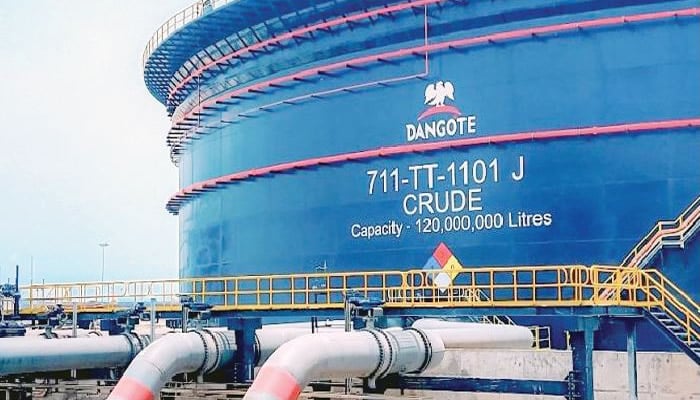
The Dangote Petroleum Refinery and several modular refineries in Nigeria may spend approximately $8.56 billion to import an estimated 122.4 million barrels of crude oil over the next six months to achieve full operational capacity.
This translates to about $1.43 billion monthly for crude oil imports as domestic refiners grapple with uncertainties surrounding the naira-for-crude policy between the Nigerian National Petroleum Company Limited (NNPCL) and the Dangote refinery. Concerns have also emerged over the Federal Government’s ability to sustain the Domestic Crude Supply Obligation (DCSO).
A scheduled meeting between the Technical Sub-Committee on the Naira-for-Crude Policy, Dangote Refinery, and government officials, which was expected to provide clarity on the policy’s future, was abruptly postponed on Monday.
An insider familiar with the matter disclosed that the Nigerian Upstream Petroleum Regulatory Commission (NUPRC) had yet to complete its assigned task, necessitating the delay.
“They are asking for more time. Hopefully, the committee can reconvene before the Sallah holiday,” a senior government official revealed under anonymity.
With a 650,000 barrels per day (bpd) refining capacity, the Dangote refinery has reiterated its reliance on imported crude, which is now becoming a necessity due to the uncertainty surrounding the naira-for-crude agreement.
Another domestic refinery seeking to import crude from the United States is the Edo Refinery, which aims to expand its capacity to 30,000bpd. Industry sources indicate that both the Dangote and Edo refineries will require a combined 680,000bpd of crude daily.
Over six months, this equates to 122.4 million barrels of crude, and at an average price of $70 per barrel, these refiners could spend a staggering $8.56 billion on crude imports.
The Crude Oil Refinery-owners Association of Nigeria (CORAN) has expressed concerns over the failure of the government to ensure adequate crude supply to local refiners.
According to Eche Idoko, the association’s National Publicity Secretary, some refiners have been forced to seek crude from international suppliers, while others have been unable to refine a single liter in the past six to eight months due to a lack of crude.
He noted that apart from Walter Smith Refinery and Aradel Refinery, which currently source crude from their own fields, other modular refineries—including Omsa Pillar Astex, Edo Refinery, and Duport Modular Refinery—are facing severe operational challenges.
Idoko warned that the failure to allocate sufficient crude supply to local refiners poses significant political risks for the Federal Government, especially ahead of the 2027 general elections.
“Whoever is frustrating the supply of crude to local refineries is an enemy of this government and is arming the opposition with weapons ahead of the elections,” he cautioned.
Sources familiar with the situation revealed that the NNPCL has committed a large volume of crude oil to foreign creditors as part of its loan repayment agreements, making it difficult to sustain the naira-for-crude deal.
Reports from the Nigeria Extractive Industries Transparency Initiative (NEITI) and NNPCL’s 2023 financial statements show that the national oil company has pledged 8.17 million barrels of crude per month to settle debts, alongside a $9.5 billion forward oil sales deal.
Following the collapse of naira-for-crude negotiations, the Dangote Petroleum Refinery announced a temporary halt in the sale of petroleum products in naira. The company cited a mismatch between its sales proceeds and its crude oil purchase obligations, which are denominated in US dollars.
In an official statement, the refinery explained:
“To date, our sales of petroleum products in naira have exceeded the value of naira-denominated crude we have received. As a result, we must temporarily adjust our sales currency to align with our crude procurement currency.”
The decision has sparked widespread concerns about a possible petrol price hike, as domestic refiners are left with no choice but to import crude oil.
With the postponement of the crucial Naira-for-Crude Policy meeting and the ongoing crude supply crisis, the future of local refining in Nigeria remains uncertain. Industry experts warn that unless the government resolves supply bottlenecks, the nation may remain heavily dependent on fuel imports, despite having some of Africa’s largest refineries.
As refiners continue to struggle with rising production costs, stakeholders are urging the Federal Government to act swiftly to prevent a full-blown energy crisis.
Comments